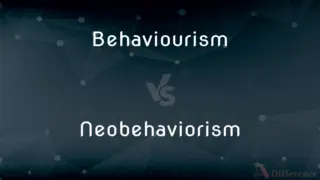Surveillance vs. Vigilance — What's the Difference?
By Tayyaba Rehman & Urooj Arif — Updated on May 2, 2024
Surveillance involves monitoring behaviors using technology or direct observation, while vigilance refers to alert watchfulness by individuals, often without tools.

Difference Between Surveillance and Vigilance
Table of Contents
ADVERTISEMENT
Key Differences
Surveillance typically implies systematic observation using cameras, software, or other equipment to track activities or behaviors, aimed at security or data gathering. Vigilance, on the other hand, denotes the personal attentiveness and alertness one maintains, usually to avoid danger or notice unusual activities.
In the context of security, surveillance systems are deployed to continuously record and analyze environments or individuals, often in a passive manner. Vigilance involves a more active engagement, where individuals consciously keep watch, relying on human senses and intuition.
Surveillance is often associated with institutions like governments or corporations that require oversight over large areas or populations. Vigilance, whereas, is generally an individual responsibility or behavior, crucial in everyday situations like watching over children or being aware of one’s surroundings.
Technological advancements have significantly enhanced the effectiveness of surveillance, making it possible to monitor vast areas with minimal human intervention. Vigilance, however, remains inherently human and depends on personal awareness and cognitive alertness.
Legal and ethical considerations around surveillance are frequently debated, particularly concerning privacy issues and the scope of observation. Vigilance, on the other hand, typically involves fewer legal implications, focusing more on personal safety and responsibility.
ADVERTISEMENT
Comparison Chart
Definition
Monitoring conducted using technology
Alert watchfulness by individuals
Primary Function
Security, data collection, control
Personal safety, alertness
Tools Required
Cameras, drones, software
None (reliant on human senses)
Typical Users
Governments, corporations
Individuals
Legal and Ethical Concerns
Privacy issues, scope of observation
Generally fewer concerns
Compare with Definitions
Surveillance
Observation of a place or people using electronic equipment.
The bank installed surveillance cameras for enhanced security.
Vigilance
Keeping watch over a person or group's safety.
As a lifeguard, her vigilance saves lives.
Surveillance
Surveillance in a healthcare setting, observing patient status.
Nurses conduct surveillance on patient vital signs round the clock.
Vigilance
The action of keeping careful watch for possible danger.
His vigilance prevented a potential burglary.
Surveillance
A method used by governments for intelligence gathering.
Satellite surveillance helps in geopolitical monitoring.
Vigilance
Alertness and attention to detail.
Vigilance is essential when driving in heavy traffic.
Surveillance
Continuous watch for the purpose of control.
The wildlife reserve uses surveillance to track animal movements.
Vigilance
A personal quality of being watchful.
Vigilance against misinformation is vital in the digital age.
Surveillance
Monitoring of behavior or communications often for security.
Internet surveillance has increased dramatically.
Vigilance
Mental alertness to environmental changes.
Early settlers needed great vigilance against wildlife.
Surveillance
Surveillance is the monitoring of behavior, many activities, or information for the purpose of information gathering, influencing, managing or directing. This can include observation from a distance by means of electronic equipment, such as closed-circuit television (CCTV), or interception of electronically transmitted information like Internet traffic.
Vigilance
The action or state of keeping careful watch for possible danger or difficulties
Security duties that demand long hours of vigilance
Surveillance
Close observation of a person or group, especially one under suspicion.
Vigilance
Alert watchfulness.
Surveillance
The act of observing or the condition of being observed.
Vigilance
Alert watchfulness.
Surveillance
Close observation of an individual or group; person or persons under suspicion.
Vigilance
Close and continuous attention.
Surveillance
Continuous monitoring of disease occurrence for example.
Vigilance
(obsolete) A guard; a person set to watch.
Surveillance
Systematic observation of places and people by visual, aural, electronic, photographic or other means.
Vigilance
The quality or state of being vigilant; forbearance of sleep; wakefulness.
Surveillance
(legal) In criminal law, an investigation process by which police gather evidence about crimes, or suspected crime, through continued observation of persons or places.
Vigilance
Watchfulness in respect of danger; care; caution; circumspection.
And flaming ministers to watch and tendTheir earthly charge; of these the vigilanceI dread.
Surveillance
Oversight; watch; inspection; supervision.
That sort of surveillance of which . . . the young have accused the old.
Vigilance
Guard; watch.
Surveillance
Close observation of a person or group (usually by the police)
Vigilance
The process of paying close and continuous attention
Vigilance
Vigilant attentiveness;
He keeps a weather eye open for trouble
Common Curiosities
What is the main purpose of surveillance?
To monitor behaviors and activities for security or information gathering.
What are the ethical concerns with surveillance?
Privacy invasion and the extent of monitoring are primary concerns.
Is vigilance only important in dangerous environments?
No, vigilance is important in everyday life to ensure personal and communal safety.
Which is more effective in public safety?
Both are crucial but serve different roles; surveillance for widespread monitoring and vigilance for immediate, personal contexts.
Do both surveillance and vigilance require training?
Surveillance operators often need technical training, whereas vigilance is more about personal awareness and can be improved with experience.
How does vigilance contribute to safety?
By maintaining alertness, individuals can identify and respond to potential threats.
Can vigilance be enhanced by technology?
Technology can assist but vigilance primarily depends on human cognitive skills.
How do technologies enhance surveillance?
Technologies like AI and machine learning help analyze vast data more efficiently than humanly possible.
Can surveillance replace vigilance?
While surveillance can extend the reach of monitoring, it cannot fully replace the nuanced awareness that human vigilance provides.
How can individuals improve their vigilance?
By practicing mindfulness and being aware of their environment.
What is a common use of surveillance in everyday life?
Traffic monitoring and public area security are common uses.
Share Your Discovery

Previous Comparison
Offside vs. Encroachment
Next Comparison
Improbable vs. UnlikelyAuthor Spotlight
Written by
Tayyaba RehmanTayyaba Rehman is a distinguished writer, currently serving as a primary contributor to askdifference.com. As a researcher in semantics and etymology, Tayyaba's passion for the complexity of languages and their distinctions has found a perfect home on the platform. Tayyaba delves into the intricacies of language, distinguishing between commonly confused words and phrases, thereby providing clarity for readers worldwide.
Co-written by
Urooj ArifUrooj is a skilled content writer at Ask Difference, known for her exceptional ability to simplify complex topics into engaging and informative content. With a passion for research and a flair for clear, concise writing, she consistently delivers articles that resonate with our diverse audience.














































